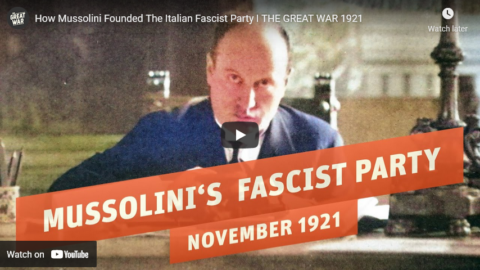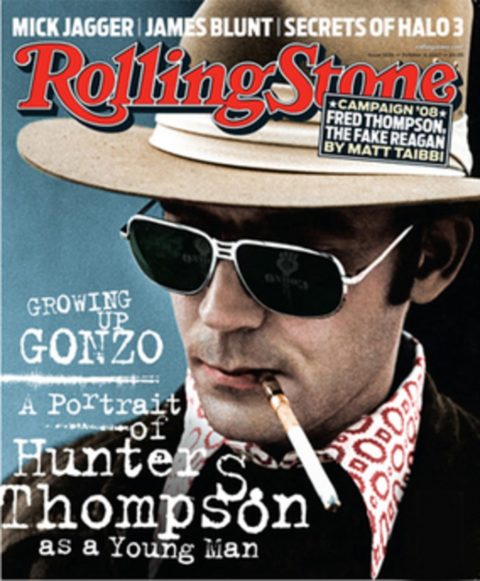The Great War
Published 12 Nov 2021Sign up for Curiosity Stream and get Nebula bundled in and SAVE 26%: https://curiositystream.com/thegreatwar
Benito Mussolini’s National Fascist movement was a fringe phenomenon right after the First World War and couldn’t gain much traction in the 1919 elections. But soon after Mussolini was increasing his political standing and the National Fascist Party gained more members than ever before.
» SUPPORT THE CHANNEL
Patreon: https://www.patreon.com/thegreatwar» OUR PODCAST
https://realtimehistory.net/podcast – interviews with World War 1 historians and background info for the show.» BUY OUR SOURCES IN OUR AMAZON STORES
https://realtimehistory.net/amazon *
*Buying via this link supports The Great War (Affiliate-Link)» SOURCES
Alcalde, Ángel, War Veterans and Fascism in Interwar Europe, (Cambridge: Cambridge University Press, 2017)Bosworth, R. J. B., Mussolini, (London: Bloomsbury Academic, 2010)
De Grand, Alexander, Italian Fascism: Its Origins & Development, (Lincoln, NB: University of Nebraska Press, 1989)
Duggan, Christopher, Force of Destiny: A History of Italy since 1796, (London: Penguin Books, 2008)
Martins, Carlos Manuel, From Hitler to Codreanu: The Ideology of Fascist Leaders, (London: Routledge, 2020)
Neville, Peter, Mussolini, (London: Routledge, 2004)
Weyland, Curt, Assault on Democracy: Communism, Fascism, and Authoritarianism During the Interwar Years, (Cambridge: Cambridge University Press, 2021)
» MORE THE GREAT WAR
Website: https://realtimehistory.net
Instagram: https://instagram.com/the_great_war
Twitter: https://twitter.com/WW1_Series
Reddit: https://reddit.com/r/TheGreatWarChannel»CREDITS
Presented by: Jesse Alexander
Written by: Jesse Alexander
Director: Toni Steller & Florian Wittig
Director of Photography: Toni Steller
Sound: Toni Steller
Editing: Jose Gamez
Motion Design: Philipp Appelt
Mixing, Mastering & Sound Design: http://above-zero.com
Maps: Daniel Kogosov (https://www.patreon.com/Zalezsky)
Research by: Jesse Alexander
Fact checking: Florian WittigChannel Design: Yves Thimian
Contains licensed material by getty images
All rights reserved – Real Time History GmbH 2021
November 13, 2021
How Mussolini Founded The Italian Fascist Party I THE GREAT WAR 1921
The patron saint of “Gonzo” journalism was a pretty cruddy human being
As I mentioned in an earlier post on one of Hunter S. Thompson’s famous early books, I discovered the writer at a particularly susceptible age … teenagers of my generation were generally suckers for counter-culture heroes (being too young to be actual hippies because we were in primary school when the Summer of Love flew past, and therefore feeling we’d missed out on something Big and Important and Meaningful). As a gullible teen, I believed Fear and Loathing in Las Vegas was mostly factual with some obvious-even-to-me embroideries for dramatic or comedic effect. I could easily forgive the guessed-at 10% fiction, but Thompson eventually admitted that the majority of the story was bullshit. Entertaining bullshit, but bullshit.
Which, as it happens, turns out to have been Thompson’s life-long modus operandi, as Kevin Mims repeatedly highlights in his Quillette review of David S. Wills’ biography called High White Notes: The Rise and Fall of Gonzo Journalism:
In High White Notes, his riveting new biography of Hunter S. Thompson, journalist David S. Wills describes Thompson as America’s first rock star reporter and compares him to Mick Jagger. But by the time I finished the book, I’d decided that Thompson bore a closer resemblance to Donald Trump. The two men were born nine years apart, during white American masculinity’s golden age. Both were obsessed with politics without possessing anything that could be described as a coherent political philosophy. Both men longed for some mythical American paradise of the past. Both men screwed over multiple friends and business partners. Both men would have gone broke if not for the frequent intervention of helpful patrons. Both men were egomaniacs fond of self-mythologizing and loath to share a spotlight with anyone. Both men enjoyed making disparaging remarks about women, minorities, the disabled, and other disadvantaged people. Both men were frequently disloyal to their most loyal aiders and abetters. Thompson’s endless letter writing and self-pitying 3am telephone calls to friends and colleagues were the 20th century equivalent of Trump’s late-night Twitter tantrums. Both men generally exaggerated their successes and blamed their failures on others. Both men mistreated their wives. Both men nursed a constant (and not entirely irrational) sense of grievance against perceived enemies in the government and the media. Both men had a colossal sense of entitlement …
The list could go on and on. Trump actually fares better than Thompson by various measures. For instance, Trump has never had a drug or alcohol problem, as far as I know. Thompson was a drug and alcohol problem. The first US president in living memory without a White House pet seems to have no interest in animals. Thompson enjoyed tormenting them. Rumors have circulated since 2015 that a recording exists of Trump using a racial slur but since the evidence has never surfaced, it might be fairer to conclude (at least provisionally) that this is not one of his many character failings. Thompson’s published and (especially) unpublished writings are full of such language.
All of which may lead you to conclude that High White Notes is not a favorable account of Hunter S. Thompson’s life and work. To the contrary, David S. Wills is a Thompson devotee who considers his subject to have been a great writer and, at times, a great journalist. But Wills is an honest guide, so his endlessly entertaining biography manages to be both a fan’s celebration and unsparing in its criticism of Thompson and his work.
Though impressive, the book is not without faults. Wills relies too heavily on cliché (“This book will pull no punches”; “breathing down his neck for the final manuscript”; “women threw themselves at him” etc.), and has a tendency to find profundity in unnaturally strained readings of Thompson’s prose. For instance, Wills describes a scene from a 1970 profile Thompson wrote of French skier Jean-Claude Killy, in which three young boys approach Thompson and ask if he is Killy. Thompson tells them that he is, then holds up his pipe and says, “I’m just sitting here smoking marijuana. This is what makes me ski so fast.” This sounds to me like standard Thompson misbehavior, but Wills infers something more complex: “On the surface, it appears to be comedy for the sake of comedy but in fact it is a comment on the nature of celebrity and in particular Killy’s empty figurehead status.” And when Thompson describes Killy as resembling “a teenage bank clerk with a foolproof embezzlement scheme,” Wills remarks, “Thompson has succeeded mightily not just in conveying [Killy’s] appearance but in hinting at his personality. He has placed an image in the head of his reader that will stick there permanently. It was something F. Scott Fitzgerald achieved, albeit in more words, when he had Nick Carraway describe Jay Gatsby’s smile.” (The book, by the way, takes its title from Fitzgerald, who used the phrase to describe short passages of writing so beautiful that they stand out from the larger work of which they are a part.)
[…]
Thompson’s big break as a writer came in 1965 when he was hired to write an article about the Hell’s Angels motorcycle gang for the Nation. The piece was so popular that Thompson found himself besieged by publishers who wanted him to expand it into a full-length nonfiction book. The Thompsons moved into the Haight-Ashbury district of San Francisco and Thompson set about writing Hell’s Angels, the 1967 book that would make him famous. Even in that first book, written before he had fully formulated the concept of Gonzo journalism, Thompson was already tinkering with the truth and engaging in the kind of self-mythologizing that would become a hallmark of his work. And that didn’t sit well with the Hell’s Angels themselves. According to Sonny Barger, a founding member of the Angels, Thompson “would talk himself up that he was a tough guy, when he wasn’t. When anything happened, he would run and hide.” Barger’s assessment of the book was terse: “It was junk.”
Wills notes that Thompson “tended to write about himself in ways that built his legend … to prove his machismo on paper. The back cover [of Hell’s Angels] describes him as ‘America’s most brazen and ballsy journalist’ and in the book he tells the story of first meeting the Angels and trying to impress them by shooting out the windows of his own San Francisco home. Such moments of bravado tend to enter the story very briefly and seem to serve little purpose beyond this self-mythologizing.”
But it was exactly this kind of self-mythologizing — the bragging about his drug use and general misbehavior — that editors of American magazines found so exciting about Thompson’s work, so it’s no wonder that he engaged in so much of it. It was his wild man persona that made Warren Hinckle of Scanlan’s Monthly want to unleash him among the socialites of Louisville. Still, Thompson didn’t fully emerge as a countercultural hero until he began to write for a small start-up publication in San Francisco called Rolling Stone.
Here’s Looking at You, Bill – The Secret Preparations for Operation Torch – WW2 – Spies & Ties 10
World War Two
Published 12 Nov 2021To smooth the way for the Allied invasion of French North Africa, Operation Torch, a massive spy operation is set up in 1941 and 42.
(more…)
The unrealistic expectations society has of minimum-wage security guards
As a teenager, I worked several months as a security guard. In the 1970s in Ontario, to work as a security guard you basically needed to be physically fit (to a not-very-high standard), to pass a police background check and to be 18 or over. The jobs I worked were usually overnight shifts at upscale apartment buildings, industrial facilities and fill-in shifts at retail malls to cover for regular security staff vacations (plus one really interesting midnight shift on a ship docked in Toronto harbour). I think I was paid $3 per hour, and 99% of the time the work wasn’t worth any more than that. It’s that 1% of situations where the company hiring security guards might wish they’d invested in better-trained staff. According to Joshua Hind‘s article in The Line, the standards for security guards have been improved in the many years since my time, but that 1% is still a big issue:
While some of the best minds in the field of crowd management and event safety weigh in on the probable causes of the crowd surge, a new article in Rolling Stone has turned a spotlight on the security guards, and the culpability of private security in general, a high turnover, low-wage business focused on filling orders with warm bodies, seemingly regardless of their actual experience or competency. In Canada, security work is one of the easiest routes to employment for young people and particularly recent immigrants with little Canadian work experience, but, when it comes to live events, it’s also an often impossible mix of customer support, crowd management, law enforcement, and emergency medical services that requires years of training and on-the-ground experience to do well.
The apparent failures of this type of security, which is often referred to as “contract security” (not be confused with “private security”, which usually means expensive bodyguards), are not unique to Houston. I’ve been working in large public events for more than 20 years and contract security has always been one of the great planning dilemmas. If you want to get insured, you need lots of security, but every one of those guards must be treated as part asset and part liability.
Event sites, especially festivals with multiple stages, are expansive (the site in Houston was over 1,000,000 square feet in total space), and a well-designed event site, just like a well-designed building, needs plenty of entrances and exits, each of which must be adequately staffed. Guards are needed in front of the stage, in the crowd, at backstage access points, and around critical infrastructure. On top of all that you also need a team of roving guards to patrol the site looking for issues. Add it up and a large event site could have dozens or hundreds of security guards doing a variety of jobs, all of which fall under the catch-all description of “security”. On a big summer weekend at the height of event season, a large city like Toronto might have thousands of guards working dozens of sites. How do you find that many good people who can bear the responsibility of preserving public safety? Generally, you don’t.
It only requires a two-week commitment and a little patience to become a security guard in Ontario. So long as you have a clean criminal record, you can sign up for the required training: 40 hours on law and security, plus another 30-40 hours of first aid. This training is often performed by the very companies that do the hiring, which can greatly affect priorities in accurate skills testing. Hit all those marks and mere weeks after deciding to become a security guard you could be faced with a horde of concertgoers busting through the fence you’ve just been ordered to protect.
When I started in live events, it was all on the technical side, setting up lighting, sound and stages, and I didn’t pay much attention to what happened on the other side of the crowd barrier. About 15 years ago I started working on Nuit Blanche, Toronto’s overnight outdoor art event, and it was during those long nights watching hundreds of thousands and then millions of people that I developed a sense of how they act in large groups and how unpredictable they can be. This isn’t meant to sound like a superpower, it’s just a honed instinct. It took me well over a decade of steady work and constant observation to develop some ability to sense when a crowd might turn ugly. That experience can’t be replicated with two weeks of training, but that’s exactly what’s often expected of security guards.
Creation of Israel
The Cold War
Published 1 Jun 2019Our series on the history of the Cold War period continues with a documentary on the creation of Israel, Zionist movement, reactions and diplomatic maneuvers of other states and the build-up to first Arab-Israeli war
Consider supporting us on Patreon: https://www.patreon.com/thecoldwar
QotD: Boris Johnson as Billy Bunter, the “Fat Owl of the Remove”
One can only suspect some insidious intent – or trolling, if one wishes to call it by its proper name – when the Scottish police force had to rename the operation designed to protect Boris Johnson in his current visit to the country. It now rejoices in the unexceptional title of “Operation Aeration”, but until it attracted adverse publicity, its original name was “Operation Bunter”.
Although a spokesman for the Scottish police said, with tongue so far in cheek that it was astonishing they could speak, “Operational names are auto-generated by computer and can be changed if they are deemed to be inappropriate”, the comparison between the Prime Minister and Frank Richards’ legendary creation Billy Bunter, the “Fat Owl of the Remove” is a far from flattering one.
In Richards’ stories, Bunter is a gluttonous, lazy, dishonest and academically negligible student at Greyfriars School in Kent, forever attempting to obtain loans from his fellow schoolboys on the promise that a non-existent postal order is going to arrive from his wealthy relatives at “Bunter Court”. It is made clear that, for all his fantasies of wealth and success, Bunter’s home is in fact the considerably more modest “Bunter Villa”, which possesses merely one maid and one cook. Richards therefore invites his readers to condemn Bunter as an arriviste to the English public school system, amongst his many other sins. He is repulsive in appearance, significantly overweight, perpetually dirty and often given to thoughtless instances of racism and xenophobia. And his famous catchphrases – “I say, you fellows!” and, when he is being beaten, kicked or otherwise abused, “yarooh!” – are irritating, rather than witty or charming.
Needless to say, the books that featured him as their lead character were hugely successful for decades, but now, in our more censorious and self-aware image, have fallen into obscurity. None of them are currently in print, and the last time that any of the novels were reissued was in the early Nineties. When the news story about Operation Bunter broke, many papers had to explain exactly who the character was, and why the allusion was apposite. While the milder likes of Jennings and William continue to be much loved by parents and grandparents of a certain generation, Bunter and his fellow denizens of Greyfriars have found themselves condemned to a kind of literary Siberia, and show few signs of coming in from this particular cold. Is there any hope that some literary-minded minister will intervene and aid the Fat Owl’s rehabilitation? Or are the books simply too outrageous and un-PC for our contemporary tastes?
Alexander Larman, “Boris Bunter”, The Critic, 2021-08-09.







